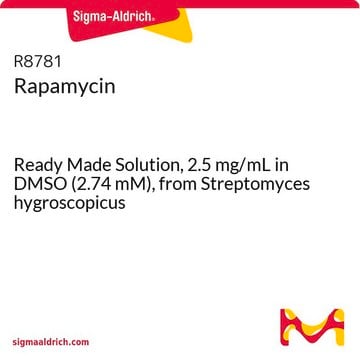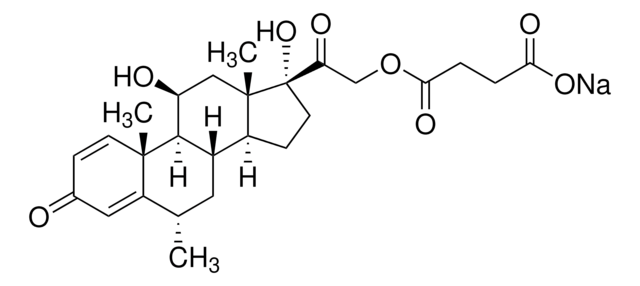SML2282
Everolimus
≥95% (HPLC), powder, P-glycoprotein substrate
Synonym(s):
Everolimus, 40-O-(2-Hydroxyethyl)rapamycin, 42-O-(2-Hydroxyethyl)-rapamycin, RAD 001, RAD001, SDZ-RAD, 42-O-(2-Hydroxyethyl)rapamycin
About This Item
Recommended Products
product name
Everolimus, ≥95% (HPLC)
Assay
≥95% (HPLC)
form
powder
color
white to beige
solubility
DMSO: 2 mg/mL, clear
shipped in
wet ice
storage temp.
−20°C
SMILES string
O=C(C([C@@]1(O)[C@H](C)CC[C@](C[C@H](OC)/C(C)=C/C=C/C=C/[C@@H](C)C[C@@H](C)C2=O)([H])O1)=O)N3[C@H](C(O[C@@]([C@@H](C[C@@]4([H])C[C@@H](OC)[C@H](OCCO)CC4)C)([H])CC([C@H](C)/C=C(C)/[C@@H](O)[C@H]2OC)=O)=O)CCCC3
InChI
1S/C53H83NO14/c1-32-16-12-11-13-17-33(2)44(63-8)30-40-21-19-38(7)53(62,68-40)50(59)51(60)54-23-15-14-18-41(54)52(61)67-45(35(4)28-39-20-22-43(66-25-24-55)46(29-39)64-9)31-42(56)34(3)27-37(6)48(58)49(65-10)47(57)36(5)26-32/h11-13,16-17,27,32,34-36,38-41,43-46,48-49,55,58,62H,14-15,18-26,28-31H2,1-10H3/b13-11+,16-12+,33-17+,37-27+/t32-,34-,35-,36-,38-,39+,40+,41+,43-,44+,45+,46-,48-,49+,53-/m1/s1
InChI key
HKVAMNSJSFKALM-GKUWKFKPSA-N
Gene Information
human ... FKBP1A(2280)
Looking for similar products? Visit Product Comparison Guide
Application
Biochem/physiol Actions
Signal Word
Warning
Hazard Statements
Precautionary Statements
Hazard Classifications
Aquatic Acute 1 - Aquatic Chronic 1 - Carc. 2 - Repr. 2 - STOT RE 2
Target Organs
Kidney,Testes
Storage Class Code
11 - Combustible Solids
WGK
WGK 2
Flash Point(F)
Not applicable
Flash Point(C)
Not applicable
Certificates of Analysis (COA)
Search for Certificates of Analysis (COA) by entering the products Lot/Batch Number. Lot and Batch Numbers can be found on a product’s label following the words ‘Lot’ or ‘Batch’.
Already Own This Product?
Find documentation for the products that you have recently purchased in the Document Library.
Customers Also Viewed
Our team of scientists has experience in all areas of research including Life Science, Material Science, Chemical Synthesis, Chromatography, Analytical and many others.
Contact Technical Service









